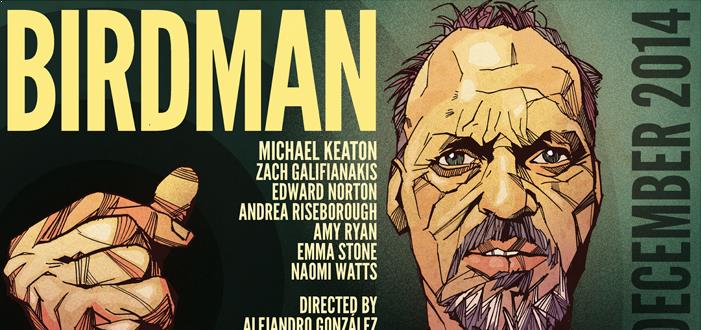
Birdman
Birdman
2014’s Birdman or the Unexpected Virtue of Ignorance is a mediation on the urgency and unabashed relentless reach toward fame, that, while once captured and lost, is desperately in search once again. The lead, Riggen Thomson, is a washed-up Hollywood actor, only known for portraying the comic book hero Birdman some twenty-odd years ago. In a mid-life crisis of sorts, he seeks redemption by adapting, directing, and acting in a Raymond Carver play. Slowly we begin to see his earnestness as really being more a resuscitation effort of his career; not so much a call to being recognized as a credible performance artist, but as a reminder to Hollywood some 3,000 odd miles away that he still exists and would love a chance at starring in Birdman 4.
Mr. Inarritu, the director, does a phenomenal job exposing the internal organs of the entire production, but most of all, Mr. Thomson’s insecurities as a man who feels he has fallen into the abyss of the average, nameless, man. Despite being constantly bombarded for picture and autograph requests, Thomson feels he is dreadfully on their level now, despite being as close as possible to quote “a God”. This in itself is an interesting exposition the film directs us towards examination, which is, regardless of the historical epoch, the immediacy in the ability for a human to rise above most, to be recognized as such, and to become something of a sacred object. Anciently this was befitting of royalty, but now, it is those who become cultural objects for society to chew and digest on and later on spit out.
It is this discarding which people like Thomson did not sign up for when their wishes were fulfilled; in all honesty, his lurching for a bygone era of being an ephemeral legend for playing make believe indicates he always had this impulse toward using his acting craft, contra the more quote authentic and self-deprecating Mike Skinner who lives for the stage. Such a real artist, as outlandish as he is portrayed by the film, has no concern for the annual pilgrimage to the sunshine in the west. Those who make that climb most often do so for the fame and for the fortune. The struggle of being a broadway actor is not appetizing enough to withstand. And yet, what makes Mr. Skinner so self-deprecating is that he too is performing within a commercial machine. The show requires capital to produce and ticket sells to justify the investments in the first place. It is only, at least in his mind at least, some semblance of craft, of intelligence, in portraying the human experience theatrically than through the willful manipulation of captured motions accomplished by filmmakers. In a word, then, Mr. Skinner defames the entire cinematic project as inferior to the stage, instead of the presented target its base pandering to grow the purse.
I suppose what is revealed is Mr. Thomson’s inner character. He always believed himself to be extraordinary, perhaps because he was shaped by the culture which gives the impression actors who are seen by millions are such. And with his lone blockbuster franchise in Birdman, he found validation in that belief, until he could no longer bear with the truth: that he was never was.
Grade: A+

